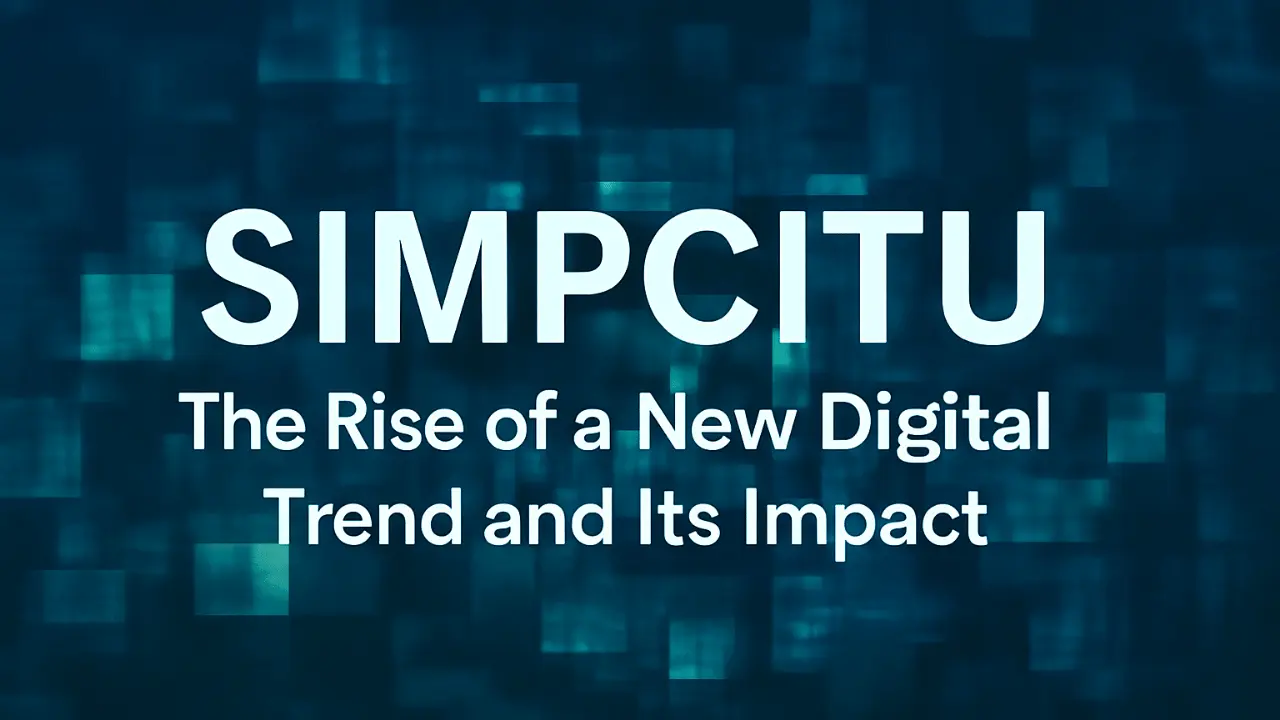The digital age has given rise to many new terms and trends, some of which become viral sensations overnight. One such term is simpcitu. This relatively new addition to internet slang has sparked curiosity and debate, especially among younger audiences who frequent social media platforms like TikTok, Twitter, and Reddit. But what exactly is simpcitu, and how has it taken the internet by storm? In this article, we’ll explore its meaning, cultural significance, and the social implications of this evolving term.
What Is Simpcitu?
At its core, simpcitu is a blend of two popular internet terms: “simp” and “civility” or “situational,” depending on the interpretation. While this portmanteau might sound quirky at first, it represents something more profound in today’s online interactions.
- Simp: Originally, the term “simp” was used to describe someone who is excessively attentive or devoted to someone else, often in a romantic or unreciprocated context. The term quickly became a subject of humor and mockery, especially when used to describe someone who would go to great lengths to please someone they liked without getting much in return.
- Civility or Situational: The second part of simpcitu is either derived from “civility,” which suggests politeness and respect in interactions, or “situational,” referring to behaviors that are dependent on the context or circumstance.
When combined, simpcitu embodies a shift in online culture where showing kindness, emotional expression, and care for others is encouraged. It challenges the notion of emotional restraint and promotes being openly affectionate and considerate, without the fear of judgment.
Why Has Simpcitu Become So Popular?
The rise of simpcitu can be attributed to several factors, particularly the way social media has reshaped human behavior and interactions in the digital world.
Influencer Culture and Parasocial Relationships
In recent years, the influencer industry has boomed, with millions of people following individuals on platforms like Instagram, YouTube, and TikTok. The relationship between influencers and their followers is often parasocial—meaning one-sided. Followers may feel a deep emotional connection to influencers despite having no personal interaction with them. This dynamic has led to an uptick in simpcitu behavior, where fans might display excessive admiration or care for influencers they’ve never met.
Meme Culture and Satire
Simpcitu has also flourished through internet meme culture, where exaggerated expressions of affection and devotion are often used humorously. These memes depict characters or individuals in absurd or over-the-top scenarios to mock “simping” behavior. Simpcitu, in this sense, often functions as a playful commentary on these behaviors, offering both a critique and a celebration of how people express their emotions online.
The Need for Social Media Validation
In today’s social media landscape, where likes, comments, and shares are the currency of social engagement, there’s an inherent pressure to stand out and gain attention. This dynamic has contributed to the popularity of simpcitu, as users express exaggerated emotions or devotion in hopes of gaining validation and recognition from others.
The Psychology Behind Simpcitu
The concept of simpcitu isn’t just a fleeting trend—there’s a psychological and social aspect that reflects deeper shifts in the way people communicate and form connections in the digital age.
Encouraging Emotional Vulnerability
One of the key ideas behind simpcitu is the promotion of emotional vulnerability. In the past, particularly in certain cultural contexts, men, for example, were often expected to keep their emotions in check and avoid showing overt signs of affection or care. Simpcitu challenges this notion by normalizing emotional openness, especially in online spaces. By expressing affection or devotion, individuals can foster more meaningful and authentic interactions.
Changing Relationship Dynamics
Simpcitu also reflects a shift in relationship dynamics, both online and offline. As digital platforms become more integrated into daily life, they influence the way people interact and form relationships. Simpcitu exemplifies how people now use social media to express admiration and affection, often pushing boundaries in ways that would be deemed inappropriate in face-to-face interactions.
Redefining Masculinity and Femininity
Simpcitu is also part of a broader conversation about the redefinition of masculinity and femininity in modern society. The internet has become a space for rethinking traditional gender roles, allowing for greater flexibility in how people express their emotions and desires. Simpcitu, in a way, contributes to the dismantling of traditional gender norms by encouraging emotional openness, empathy, and kindness—qualities that were once stereotypically associated with femininity but are now embraced by all genders.
How Simpcitu Is Shaping Online Communities
Simpcitu is more than just a term—it’s a reflection of broader trends in online culture. As digital communities continue to grow and evolve, behaviors like simpcitu are shaping the ways people communicate and form bonds.
Building Emotional Connections Through Content
Simpcitu allows people to express genuine emotions and care for others through online content, whether it’s in the form of comments, videos, or memes. This type of emotional exchange fosters a sense of belonging and validation, which is crucial for the mental well-being of online users.
The Role of Social Media Platforms
Platforms like Twitter, TikTok, and Instagram have created spaces where people can interact with others without the constraints of geography or physical presence. This opens up opportunities for more expressive and vulnerable interactions, with simpcitu serving as an example of how these interactions can manifest. Online communities that embrace simpcitu often provide safe spaces for people to show affection, seek comfort, and support one another.
Simpcitu and Its Impact on Digital Etiquette
As simpcitu continues to gain traction, it may eventually influence how digital etiquette is perceived and practiced. The term challenges conventional online communication norms, particularly those around expressing feelings and emotions. Over time, we may see a more open and accepting attitude toward emotional expression, creating a more inclusive and compassionate digital environment.
Conclusion
Simpcitu is not just a passing trend—it’s a reflection of evolving attitudes towards emotional expression, relationships, and online behavior. By embracing kindness, vulnerability, and affection in the digital space, simpcitu challenges old norms and encourages a more open and inclusive online culture. As social media continues to shape the way we connect with others, terms like simpcitu will likely continue to gain significance, further influencing how we communicate and build relationships in the digital age.
FAQs
What does simpcitu mean?
Simpcitu is a combination of “simp” and either “civility” or “situational,” reflecting an online culture where emotional openness, kindness, and devotion are expressed without fear of judgment.
How did simpcitu become popular?
Simpcitu became popular due to the rise of influencer culture, meme humor, and the need for social media validation. It has been embraced as a way to express emotional vulnerability and devotion.
Is simpcitu a positive or negative term?
impcitu can be both positive and negative, depending on the context. It can encourage kindness and emotional openness but may also be used ironically to mock excessive devotion in online spaces.
How does simpcitu affect social media?
Simpcitu has changed the way people interact on social media by promoting emotional vulnerability, deeper connections, and more authentic expressions of care and admiration.
Can simpcitu impact real-life relationships?
While simpcitu mainly applies to online behavior, it can influence real-life relationships by encouraging individuals to express their feelings more openly and challenge traditional emotional norms.



